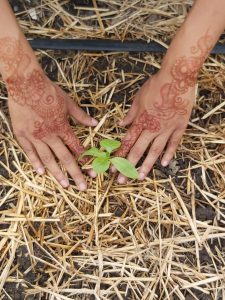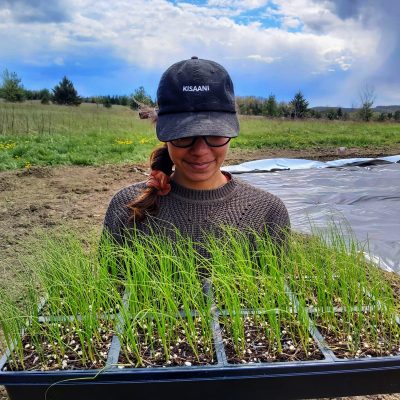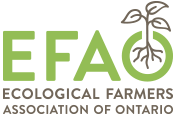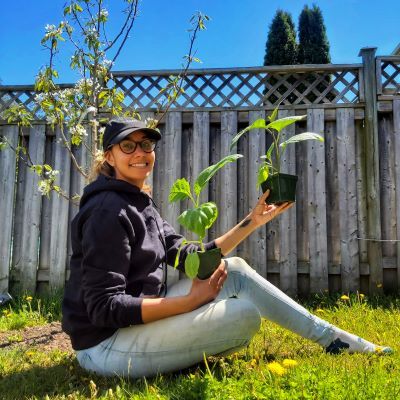Shade of Miti is a food and climate justice organization on Treaty 13 land (Mississauga, Ontario). They envision sustainable food systems in Mississauga that are rooted in sovereignty and justice, and not threatened by climate change.
This organization is for communities that experience oppression from food and climate systems as well as allies and accomplices. You can learn more about Shade of Miti at shadeofmiti.ca. The following is a Q&A with founder Rav Singh.
Can you tell us about Shade of Miti?
Shade of Miti is a farming business focused around food and climate justice. We do education and advocacy work and I farm in Caledon, using organic and climate friendly practices. I specialize in “world” or “cultural” crops — organic produce that you don’t find commonly in farmers’ markets or organic grocery stores.
Miti means soil in Punjabi. This connects me to who I am and my ancestors, and is a reminder of why I do this work. Food justice is an important aspect of my work. The “shade” part is because I’m brown and my skin reminds me of my connection to the soil. My logo is the soil texture triangle for Mississauga. The name shortens to SoM, which in farming is Soil Organic Matter. This reminds me that soil is such an important part of my work as a farmer and community leader.

Please tell us a bit more about where, how, and what you grow.
I’m growing on rented land in Caledon. I focus on growing crops such as Chinese kale, Chinese broccoli, okra, callaloo, bitter melon, cilantro, fenugreek, and a crop trial with different varieties of African eggplants. I’m growing a lot of hot peppers too.
I decided to focus on these crops for several reasons. I’ve always shopped at farmers’ markets, and I started taking my parents and grandparents with me a year or two ago. They really liked the concept, but they weren’t able to find the foods they wanted to buy, foods with cultural importance. It’s not only white people who engage with food and food systems. I believe that everyone should be able to access local organic versions of what they eat.
It’s really important for me to use my position as a farmer to be a climate leader. Right now I’m experimenting with different types of living walkways and coverings for the soil, and trying to incorporate more renewable and sustainable energy into my farm.
Where and how do you sell your products?
I sell my products at the Erin Mills Farmers’ Market in Mississauga, and through an online store. A lot of the community I want to connect with doesn’t shop at the market. Markets tend to be more white-centric food spaces and the online store is a more comfortable option. I currently do pick up and delivery through the online store, but once COVID is more manageable I want to make connections with community hubs like health and cultural centres.
What learning or training opportunities have you found helpful as a new farmer?
I’ve done a lot of formal education in agriculture which I don’t think is necessary to be a farmer. Recently I’ve been engaging with more farmer education from folks who are BIPOC or 2SLGBTQ+. I have been finding that to be more informative and relevant for my situation.
When I started farming, I had a lot of conversations with white farmers. Some were really helpful, but they don’t tend to have the same experiences of taking okra to market, or growing bitter melon, for example. My biggest tip is to look for someone who has similar experiences and identities to you, or is farming in a similar way, so you can learn about the crops and techniques you need to know about.

What does it mean to you, to be an “ecological farmer”?
Being a farmer — I like to just call myself a farmer, as I think all farming should be done ecologically — is really important to me. A lot of ecological or organic practices are so important to fight our climate crisis. It’s also really important to me because my ancestors were farmers in Punjab, in India, and until my grandpa they farmed using ecological growing methods. My parents were farmers during the Green Revolution and I see the harm it’s caused. It’s created massive problems like farmer suicides and drought in Punjab. It’s important to me that I farm in a way that doesn’t contribute to those issues.
Tell us about your podcast!
Yes! It’s called the Lassi Revolution podcast. A lassi is a delicious drink in India. At the start of the farmer protests in India I reflected on what a revolution means to me, and realized that a revolution can be small actions that add up to change. I had also started to connect with many BIPOC and 2SLGBTQ+ farmers, chefs, and activists and I was wondering how to help more people know about their amazing work. A podcast is a way to use a platform I have access to in order to share these stories and support a revolution. The podcast airs every other Friday at 3pm on Newstalk Sauga 960AM.
What are some of the future plans for your farm/business?
I want to find a rooftop or land in or close to Mississauga to farm on. It’s important for me to be in the city where I live, market, and work. I’d love to farm in Mississauga and in Caledon, and have both a rural and an urban farm in the Peel region. There’s so much potential within this region to connect urban and rural food systems, but there’s not a lot of that happening right now.
I would also love to be able to sell some of my produce to BIPOC, youth, 2SLGBTQ+ folks, and newcomer communities. And give some of my produce to caterers or restaurants, newcomers or refugees who move here with some cooking background, and have them use my produce to make food products to sell. I want to participate in the full food system and the full food cycle.
I would love to have an expanded online food store, where other BIPOC farmers can sell their products, and open it up to more than food.
I also want to do more growing education. This might be something like a social media video series. I’d like to share tips for growing things that are not really included in other farming education.

